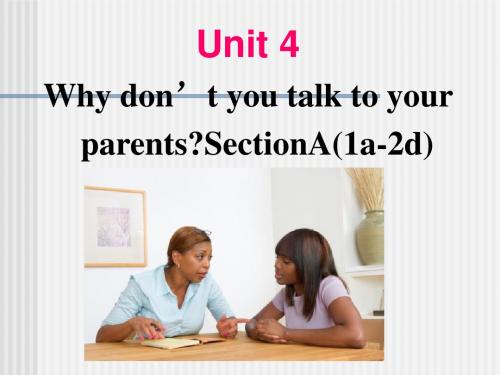unit4-Why-don't-you-talk-to-your-parents公开课教案
- 格式:doc
- 大小:86.50 KB
- 文档页数:2




Unit 4 Why don’t you talk to your parents?一.根本知识点1.Why don’t you talk to your parents? 你为什么不和你打父母谈谈呢?Why don't you do sth ?= Why not do sth? 为什么不......呢?2.My parents don’t allow me to hang out with my friends. 我的父母不允许我和我的朋友们出去闲逛。
allow sb. to do sth 允许某人做某事【拓展】allow v 允许allow doing sth 允许做某事They don’t allow smoking.allow sb. to do sth 允许某人做某事My mother allows me to watch TV.be allowed to do sth 被允许做某事3. What’s wrong? 怎么啦?【解析】What’s wrong( with sb./ sth) 〔某人/物〕怎么了?4.look through 浏览5.work out 解决;成功地开展,后跟fine,well, badly等词,说明产生的结果如何。
The teachers encourage their students to ____ the problems by themselves, and in this way students can enjoy success.A. give upB. work outC. look through5. get on with sb. 和某人和睦相处;和某人关系良好 =get along withget on well/ badly with 相处的好/坏My problem is I can’t get on with my favorite. 我的问题是我不能喝我的家人和睦相处。


Unit 4 Why don’t you talk to your parents?教材分析I.单元教材分析:本单元的话题(Topic)是“Interpersonal communication(人际交往)”。
功能项目(Functions)是“Talk about problems (谈论困难);Give advice (提出建议)。
本单元主要探讨当代中小学生所面临的种种压力和困境。
学会询问、陈述自己或他人的困难和麻烦;并针对别人的困境,使用情态动词could,should 以及Why don’t you...?句型提出解决的办法和建议;阅读文章Maybe You Should Learn to Relax,通过学习比较了东西方家长对子女教育的态度和做法,通过该部分学习,让学生学会换位思考,帮助他们逐步建立正确、积极的生活态度和价值观。
II.学情分析:本单元话题是人际交往,这个话题与学生实际生活紧密相关,主要探讨当代中小学生所面临的种种压力和困境,并针对针对这些问题给予合理地建议。
重点学习用What’s wrong?询问他人的麻烦;学习用What should I do?征求别人的建议;学习使用情态动词could,should以及Why don’t you...?句型提出解决的办法和建议;学习使用连词until,so that,although。
在Unit1已经学习力用What’s the matter with...?询问病情,其中也涉及了What’s wrong的学习,对于学生来说,已是比较熟悉的句型;而在前几个单元中,逐步学习了情态动词should,could表示建议,相信学生掌握起来也很容易;学习连词until,so that,although的用法,是本单元的重点也是难点,教师要多举例子,让学生真正明白状语从句的使用。
III.教学目标1.知识目标:A.掌握以下词汇:allow,wrong,midnight ,guess,deal,relation,communication,argue,cloud,elder,instead,whatever,nervous,offer,proper,secondly,communicate,explain,clear,copy,return,anymore,member,pressure,compete,opinion,skill,typical,football,quick,continue,compare,crazy,push,development,cause,usual,perhaps。
Unit4 Why don’t you talk to your parents讲义复习1、从事完成做某事3、干净整洁洗餐具4、倒垃圾叠衣服5、扫地整理床铺6、打扫客厅没问题7、过来做杂务8、一直;总是照顾;照看9、闲逛做家务经典易错题:用offer provide supply1、They decide to Jim the job. 他们决定让乔做这件工作。
2、We are here to a service for the public.3、Local schools many of the volunteers.许多志愿者来自当地学校。
二、新课例题一、根据句意及首字母提示完成单词1.His parents are very busy. They have little time to c with their children.2.You shouldn’t c my homework. You should do it alone.答案municate 2.copy.例二:单项填空1.His father doesn’t allow him swimming alone.A.goesB.to goC.goingD.go2.What’s with you?A.wrongB.the wrongC.matterD.up3. give him a watch?A.What aboutB.Let’sC.Why don’tD.Why don’t you4.You could save some money you can buy a gift for your mother.A.in order toB.becauseC.soD.so that5.I think the result must him very much.A.surpriseB.surprisedC.surprisingD.surprises答案:.1.B allow sb. to do sth.是固定搭配,意为“允许某人做某事”。
Unit 4 Why don’t you talk to your parents
Section A 1a—1c
一、教学目标:
1. 语言知识目标:
1) 能掌握以下单词:allow, wrong
能掌握以下句型:
①—What’s wrong?
—I have to study too much so I don’t get enough sleep.②I have too much homework so I don’t have any free time to do things I like. ③My parents don’t allow me to hang out with my friends.
④Why don’t you talk to him about it……
2. 能力目标
(1)能够运用所学知识谈论问题和困难、提出建议并做出选择;
(2)能根据对方所提出的问题,给出一些合理的建议。
3. 情感态度价值观目标:
培养学生良好的合作意识,鼓励学生大胆表达自己的想法和意愿。
正确认识生活中的一些困难,能采用正确的方式解决生活中的问题。
二、教学重难点
1) Talk about the problems.
2) Learn the new language points.
2. 教学难点:
能根据对方所提出的问题,给出一些合理的建议。
学会表达建议的一些方式。
三、教学过程
Step 1 Revision
复习上单元的内容,老师可适当带出句型why don’t you…/What’s the matter?
Step 2 Presentation
1. 导入学生们平时在学校和生活中存在的问题。
T: What’s the matter/ What’s wrong?
S: He has too much homework to do.hat's
T: Does he like to do it?
S1:No, he doesn’t. Because he doesn’t have any free time to do things he likes.
Step 3 Talking
1. Look at these problems. Do you think they are serious or not? Ss discuss with their partners and give some advice.
①I have to study too much so I don’t get enough sleep.
②I have too much homework so I don’t have any free time to do things I like. ③My parents don’t allow me to hang out with my friends.
④I have too many after-school classes.
⑤I got into a fight with my best friend.
Step 4 Practice
Show them some pictures about the problems,then ask some students to read them,and give some
advice.
T: What’s the matter/ What’s wrong?
S: He has too much homework to do.
T:What should he do?
S: He should talk to his parents.
Step 5 Listening
Step 6 Pair work
1. Show them some pictures then ask them to make some sentences..
2. Let some pairs act out their conversations.
eg. A: What’s wrong?
B: I have to study too much, so I don’t get enough sleep.
A: Why don’t you go to sleep earlier this evening?
Step 7 Make a survey;Ask your classmates about his or her problems and what kind of advice can you give,then complete the chart.
Step8 Summary
Step9 Homework
Write three conversations about your problems and your friends’ suggestions.
A: I have too many after-school classes.
What should I do?
B: You should …。